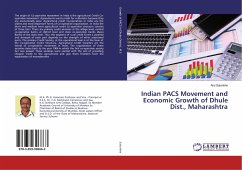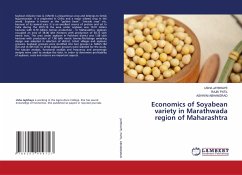
Indian PACS Movement and Economic Growth of Dhule Dist., Maharashtra
Versandkostenfrei!
Versandfertig in 6-10 Tagen
40,99 €
inkl. MwSt.

PAYBACK Punkte
20 °P sammeln!
The origin of Co-operative movement in India is the agricultural Credit Co-operative movement. Agriculturist wants credit for cultivation because they are economically poor. Agricultural credit Co-operatives in India are the oldest and most important forms of Co-operative organization. In India the short and medium term agricultural credit Co-operative structure consists of three tiers. There are primary credit societies at the village level, central co-operative banks at district level and state co-operative banks (Apex Banks) at the state level. Thus this segment of rural credit forms a pyra...
The origin of Co-operative movement in India is the agricultural Credit Co-operative movement. Agriculturist wants credit for cultivation because they are economically poor. Agricultural credit Co-operatives in India are the oldest and most important forms of Co-operative organization. In India the short and medium term agricultural credit Co-operative structure consists of three tiers. There are primary credit societies at the village level, central co-operative banks at district level and state co-operative banks (Apex Banks) at the state level. Thus this segment of rural credit forms a pyramid and strength of each part depends on the strength of other associated parts. The primary Credit Society, at the operational level is at the base of the Co-operative Credit Structure. Agricultural Credit Societies are the kernel of co-operative movement in India. The organization of these societies dates back to the year 1904 in which the first co-operative society Act was passed. These societies were started with the aim of providing cheaper credit to the agriculturist and give them freedom from the exploitation of moneylenders












